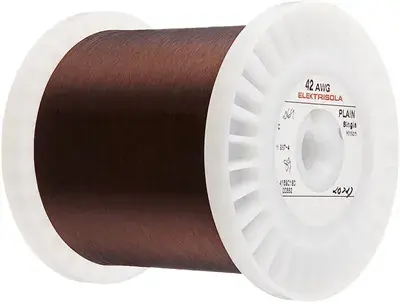
Round Copper Wire Temp Class 180 Use For Refrigeration Compressor
Refrigeration compressors play a crucial role in maintaining optimal temperature levels in various cooling systems, from household fridges to industrial refrigeration units. The efficiency and reliability of these compressors are directly linked to the quality of their components, including the type of wire used in their construction. One such wire that has gained popularity in the industry is Round Copper Wire with Temp Class 180. In this blog, we will delve into the benefits and applications of this remarkable wire in refrigeration compressors.

Understanding Round Copper Wire Temp Class 180
Round Copper Wire Temp Class 180 refers to copper wire with a thermal class rating of 180°C. The thermal class rating is a standardized system used to indicate the maximum allowable temperature that the wire can withstand during continuous operation without compromising its performance or longevity. Temp Class 180 wires are designed to withstand temperatures up to 180°C, making them suitable for demanding applications where exposure to high temperatures is common.
Advantages of Round Copper Wire Temp Class 180
High Temperature Tolerance: The primary advantage of Temp Class 180 copper wire is its ability to endure elevated temperatures without losing its electrical conductivity or structural integrity. This characteristic is particularly important in refrigeration compressors, where heat generated during operation can be significant. The wire’s ability to handle high temperatures ensures the compressor operates efficiently and reliably.
Excellent Electrical Conductivity: Copper is renowned for its exceptional electrical conductivity, which ensures minimal energy loss during the transfer of electricity. In refrigeration compressors, this translates to higher efficiency and reduced power consumption, contributing to overall energy savings.
Enhanced Mechanical Properties: Temp Class 180 copper wire exhibits excellent mechanical properties, such as flexibility and resistance to bending and deformation. These properties make it easier to wind the wire into coils, which is a critical aspect of compressor construction. Moreover, its flexibility aids in accommodating the compressor’s dynamic movements during operation, leading to improved durability and longevity.
Superior Thermal Conductivity: In addition to its electrical conductivity, copper also possesses excellent thermal conductivity. This feature allows the wire to dissipate heat efficiently, preventing excessive temperature buildup within the compressor. As a result, the risk of overheating and potential damage is significantly reduced.
Applications of Round Copper Wire Temp Class 180 in Refrigeration Compressors
Round Copper Wire Temp Class 180 finds extensive use in various types of refrigeration compressors, including:
Household Refrigerators: Modern household refrigerators rely on efficient compressors to maintain food freshness and cooling. Temp Class 180 copper wire ensures optimal compressor performance, leading to quieter operation and energy savings.
Commercial Refrigeration Units: From small convenience store coolers to large walk-in freezers, commercial refrigeration units benefit from the reliability and efficiency of Temp Class 180 copper wire.
Industrial Refrigeration Systems: Large-scale industrial refrigeration systems used in food processing plants, cold storage facilities, and chemical industries require robust compressors that can withstand demanding conditions. Temp Class 180 copper wire provides the necessary durability and thermal stability for such applications.
Conclusion
In conclusion, Round Copper Wire Temp Class 180 has emerged as a go-to choice for manufacturing refrigeration compressors due to its exceptional high-temperature tolerance, electrical conductivity, and mechanical properties. As the demand for energy-efficient and reliable refrigeration solutions continues to grow, this type of wire proves to be an essential component in enhancing the performance and longevity of refrigeration compressors across various industries. By embracing this technology, manufacturers and consumers alike can enjoy the benefits of efficient cooling systems while contributing to a sustainable future.
